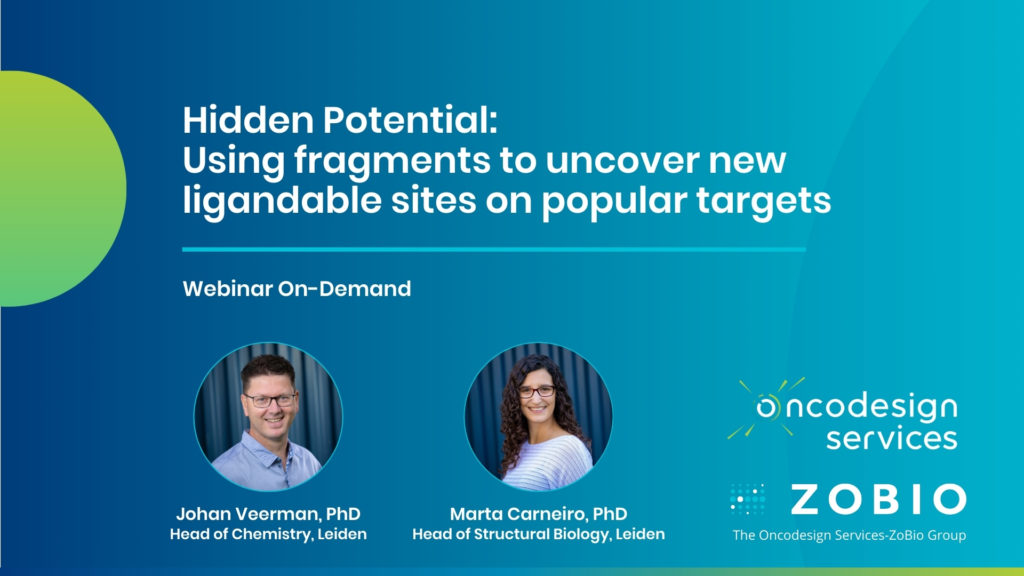


Discover how fragments can unlock novel opportunities to effectively drug established targets
There are many reasons to work on popular drug targets. Despite prolific targeting and the increased challenge of finding new ways to exploit them, established targets still represent a tried and tested route to tackle specific diseases. With a wealth of documented literature, popular targets can also represent a drug discovery pathway with fewer unknowns, making them attractive in a commercial environment where the appetite for risk is low. However, how can you discover distinct opportunities within well-trodden chemical ground?
Fragments represent a powerful method for finding effective new binding sites on established targets. However, fragments are not a universal solution. You will learn how to assess the potential value that fragment-based discovery could contribute to your research, and review how fragment screening can be leveraged to quickly uncover unexplored ligandable sites.
Delving into the detail, we also explore the impact of predefining the mode of action (MoA) on successfully achieving screening objectives, and briefly cover options for progressing promising hits rapidly. Each key area of the webinar includes illustrative data and case study examples highlighting where and how these techniques have been applied to existing drug discovery research.
View this webinar to expand and update your fragment-based drug discovery knowledge, and learn from recent examples of how fragments are being used to uncover novel opportunities for popular targets.
Learning objectives:
- Learn how to evaluate whether fragments are a viable option for investigating your chosen drug target
- Explore the impact of predefining the MoA when designing a fragment campaign
- Understand how fragments can be used to effectively explore the chemical space around popular targets to identify new ligandable sites
- Review how to use readily available analogs to rapidly progress promising fragment hits

Presenters:
Marta Carneiro, PhD.
Head of Structural Biology, Leiden
 Marta G. Carneiro received her BSc degree in Molecular and Cellular Biology at the Universidade Nova de Lisboa, Portugal. In 2010 she joined the MSc/PhD Molecular Biology program at the International Max Planck Research School in Göttingen, Germany. She conducted her doctoral research in Christian Griesinger’s group, focusing on studying protein dynamics by NMR. In 2016, Marta joined ZoBio (acquired by Oncodesign Services in early 2024), where she has been applying NMR-based structural biology to support fragment-based drug discovery programs. Since 2019 Marta has headed the Structural Biology group, which combines NMR spectroscopy, X-ray crystallography, and cryo-EM to support drug discovery campaigns.
Marta G. Carneiro received her BSc degree in Molecular and Cellular Biology at the Universidade Nova de Lisboa, Portugal. In 2010 she joined the MSc/PhD Molecular Biology program at the International Max Planck Research School in Göttingen, Germany. She conducted her doctoral research in Christian Griesinger’s group, focusing on studying protein dynamics by NMR. In 2016, Marta joined ZoBio (acquired by Oncodesign Services in early 2024), where she has been applying NMR-based structural biology to support fragment-based drug discovery programs. Since 2019 Marta has headed the Structural Biology group, which combines NMR spectroscopy, X-ray crystallography, and cryo-EM to support drug discovery campaigns.
Johan Veerman, PhD.
Head of Chemistry, Leiden
 Johan Veerman studied at the University of Amsterdam and obtained a PhD in synthetic organic chemistry in the area of solid phase chemistry under the supervision of Professors Henk Hiemstra and Floris Rutjes. He then joined Symeres as a Senior Scientist, progressing to a position as Senior Group Leader Medicinal Chemistry. In this role he was responsible for the project management of multiple teams of (medicinal) chemists in hit–to–lead campaigns, covering several disease areas. After that, he joined ZoBio (acquired by Oncodesign Services in early 2024) where he is now the head of Chemistry. In this role, he is responsible for the development and maintenance of the fragment library, project management, and medicinal chemistry support in fragment hit finding and evolution in integrated projects.
Johan Veerman studied at the University of Amsterdam and obtained a PhD in synthetic organic chemistry in the area of solid phase chemistry under the supervision of Professors Henk Hiemstra and Floris Rutjes. He then joined Symeres as a Senior Scientist, progressing to a position as Senior Group Leader Medicinal Chemistry. In this role he was responsible for the project management of multiple teams of (medicinal) chemists in hit–to–lead campaigns, covering several disease areas. After that, he joined ZoBio (acquired by Oncodesign Services in early 2024) where he is now the head of Chemistry. In this role, he is responsible for the development and maintenance of the fragment library, project management, and medicinal chemistry support in fragment hit finding and evolution in integrated projects.
